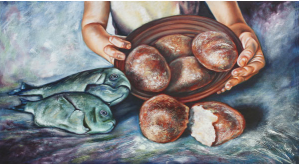Nerys writes: Historians show us that great evil and great good don’t simply happen out of the blue. They both usually begin in small incidents, barely noticed – incidents whose significance only becomes apparent once the evil or goodness has snowballed. The current pandemic and many major international conflicts can be traced back to a number of small wrongs, misjudgements, misguided attitudes or sometimes an early absence of communication. Thankfully, the same is true of goodness. Our readings today, 2 Kings 4.42-44 and John 6.1-21, give us an opportunity to celebrate the way that small acts of obedience and faith, generosity and love, can be blessed and transformed for great, widespread good, giving us glimpses of the growth of the kingdom of God in action.
First we read about the distribution of twenty barley loaves among a hundred men by the prophet Elisha at a time of famine. The bringer of the food, a man from a town dedicated to the fertility god Baal, shows remarkable selflessness and trust in God. The first of his new crop would have been welcome either to feed his family or to sell for the highest price in the market. Instead, he brings it to Elisha, a representative of God, the true Lord of the harvest. It is an impossibly small amount among such a large number, but the combination of this man’s obedience and Elisha’s faithfulness results in many more people being fed than could have been imagined.
In our Gospel reading, the generosity of the boy and Jesus’ compassion result in a vast crowd of hungry people being fed.

Most depictions of the loaves and fishes, including this one by Ilse KLeyn, aren’t accurate according to the account you’ve just read. John tells us that the loaves are made of barley – they would have been coarse and brown – and the Greek word he uses for fish means a small dried or pickled fish, not the fresh fish you’d expect so near a lake. Through these details, John is stressing not just how meagre the offering is, but also that it is the food of the poor.
It is no wonder that Andrew is tempted to despair like his friend Phillip did. What was the point of offering such a small amount when there were so many thousands of people to feed? I suppose it’s always a temptation when we look at the huge problems and needs of our world to dismiss what we have to offer. It seems so pathetically inadequate that we are often discouraged and end up doing nothing. But Jesus taught that the kingdom of God grows from small beginnings, like the tiny mustard seed that develops into a huge tree. Small acts of generosity, like that of the boy and his packed lunch, can be transformed by God who is love, for the good of many.
The work of Saint Teresa on the streets of Calcutta was sometimes dismissed by her critics as being too little to make any difference, but, in her mind, every little act of loving kindness was something beautiful for God, and infinitely worth doing. ‘Not all of us can do great things’, she used to say. ‘But we can do small things with great love’.
It is my experience that God is very good at giving us more than we asked for in our prayers and giving in ways we hadn’t even imagined. In order for God to do this, however, we need to be ready to offer, not just what we have to give, but who we are, for God to use.
In our Gospel story, John says that Jesus ‘gave thanks’ over the bread, using the Greek word which gives us ‘eucharist’, the term we use for our communion service. In our eucharistic prayer we give thanks to God but we also offer ourselves along with the bread and the wine as a gift to God, just as Jesus offered himself when he was on the earth. When we give ourselves to God like this over and over again at the eucharist or in our prayers at home, God can use our lives in ways we haven’t even thought of to be a blessing to others.
I like to think of it like this. Each of us has a lifetime’s worth of moments to offer for the use of God who is love. Each of these moments in themselves are very small, but over our lifetime, if they are filled with God’s love, they can make a huge difference to those we know and also to people we maybe will never meet.
Take a moment now to think what little things you might have to offer God this week. They might include
• a commitment to pray the news each day,
• solidarity with all who suffer or are in need.
• your homes and your relationships for God to work in,
• your conversations and your smiles,
• your involvement in God’s Church,
• every moment of every day.
Loving Father, accept the little that we offer to you in obedience and faith for we do this in the name of your Son, our Saviour, Jesus Christ. Amen.






